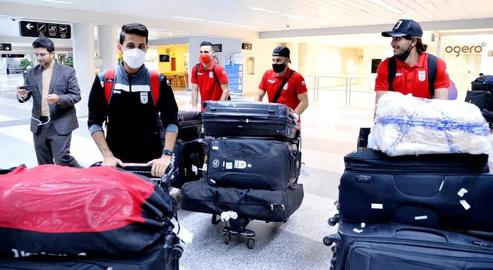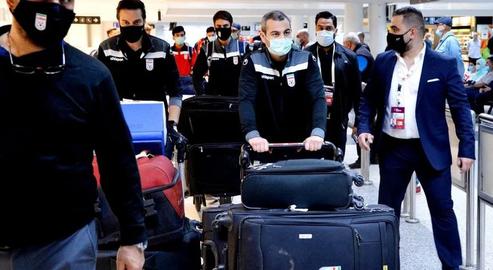With some delay due to earlier problems procuring an un-sanctioned plane, images of the players and coaches of the Iranian national football team at Beirut Airport have been shared in cyberspace. Both lay social media users and the international media have sat up and taken notice. The official account of Dubai-based news channel Al-Arabiya called the Iranian delegation’s extra luggage "controversial". The massive suitcases brought by the players to Lebanon were all uniform, and before the logo of the Iranian Football Federation.
Rather more controversially, IranWire’s own sources say the national team had a mixture of suitcases with them by the time they arrived at their accommodation in Beirut. Not one of the larger ones seen in the photos made it to the hotel.
“Dollar suitcases” is a common term used by Iranian observers users to describe unusual and suspect luggage: the local version of the fabled “suitcases full of cash”. As the team prepares to play the Lebanese national team in the World Cup qualifiers on Thursday, let’s spend a little time unpacking this term.
***
In the case of Iran, “dollar suitcases” aren’t an allusion or conspiracy theory but a statement of the facts, as frankly and proudly related by the leaders of armed groups in the Middle East who did the Islamic Republic’s bidding for money.
Last December was a classic: Mahmoud Zahar, a senior member of Hamas in the Palestinian Territories, revealed that when he visited Ghasem Soleimani, the late commander of the Islamic Revolutionary Guard Corps’ expeditionary Quds Force, in his capacity as then-foreign minister, he received "significant" gift of “financial assistance”. To whit, $22 million stuffed into suitcases at Tehran Airport. There was supposed to be more, Zahar claimed, but “the Hamas delegation consisted of nine members and we could not carry more because each suitcase [only] had room for 40 kilograms”.
The windfall had come after Zahar complained to Soleimani that Hamas was having trouble paying wages and social security to the people of Gaza. With the IRGC’s intervention, Zahar said, the issue was “fully resolved”.
On the very same day, Hassan Nasrallah, the Secretary-General of Lebanese Hezbollah, told TV station Al-Mayadin that in addition to "providing missiles" and "military equipment", Ghassem Soleimani had ensured significant “financial assistance” found its way to Hezbollah and the Lebanese people.
After the 34-day war in Lebanon in 2006 destroyed some 200,000 homes, Nasrallah said, the commander of the Quds Force had covered the living expenses, rent and reconstruction costs of what he called “the Lebanese people”. The figure in question was not cited, but on the assumption at least $10,000 was shelled out to each affected household, Soleimani would have financed Hezbollah to the tune of $2bn.
What Could The Football Team’s Convoy of Cash be For?
In the winter of 2020, the Qatar Football Federation had pledged $1.5 billion to the AFC in order to host the Asian Cup. This was more than twice the amount the AFC had asked of would-be host countries as a "financial guarantee.” Iran didn’t front such an extravagant sum, and has struggled even to get to matches this season.
Last week Hossein Sharifi, a spokesman for the Football Federation, said that the team’s official partner for air travel, the Tehran-based Zagros Airlines, did not have the necessary permits to fly to Lebanon. He went on to say a politically-motivated ban – read sanctions – was preventing other Iranian planes from landing in Beirut, as well as coronavirus-related restrictions.
Just one day later, a spokesman for the Football Federation announced that the national team would indeed be flying to Beirut as planned, with the help and support of one Rostam Ghasemi. Ghasemi is a former IRGC commander who was appointed Minister of Roads and Urban Development in Ebrahim Raisi’s new cabinet.
Now, in the so-far published pictures, not only are the team carrying quite the additional load but that load has remarkably disappeared since they left the airport. The national team arrived at their hotel, IranWire’s sources report, with ordinary bags; of the large Football Federation-stamped ones there was no trace. The pictures were widely shared by the sports channel Varzesh Seh, lifted from media close to the Revolutionary Guards like Tasnim and Fars News Agencies.
These days, the entry of football stars like Mehdi Torabi, Shojae Khalilzadeh, Hossein Kanaanizadegan, Milad Sarlak and Siavash Yazdani into foreign countries is – contrary to what Sharifi claimed – less controlled than it used to be. In recent years only the UAE and Saudi Arabia have enforced stringent security checks when the Iranian team shows up.
This time, though, the team’s arrival also comes after a jaw-dropping revelation by Gholamreza Rafiei, a legal advisor to the Football Federation, on October 20. Rafiei openly admitted that the Federation was inciting its referees at international matches to steal AFC-branded footballs for Iran Pro League matches. Trying to highlight the dire state of Iranian football in the days of sanctions, he said: “We’ve reached such a point that our international referees, when they go to matches abroad, put all the balls in a bag and bring them back to Iran with them.”
The admission could, were the AFC so inclined, lead to the exclusion of all Iranian referees and assistant referees from Asian tournaments. Some Iranians who saw the Beirut Airport pictures wondered aloud whether the team might not be returning the AFC’s footballs – or hoping to use the outsize bags to pilfer new ones.
Now in the land of Sheikh Hassan Nasrallah, there’s an awful amount a well-placed Iranian delegation might achieve with suitcases, as still looks likely, full of cash. Let’s hope with all this intrigue they are still able to keep their eye on the ball.
Related coverage:
Hamas Official Reveals Money Laundering by Ghasem Soleimani
Top Official Admits Ghasem Soleimani’s Role in Circumventing Sanctions
"Tea Money" for Contracts: New Study Lifts Lid on Iran's Bribery Culture
'No Plane' to Take Iran's National Football Team to Lebanon
Ex-Referee Blows the Whistle on Match-Fixing in Iran
The Return of the Ultimate (and Corrupt) Football Insider
Jobs for the Boys: Business Partner of Official's Sons Gets Top Football Role
visit the accountability section
In this section of Iran Wire, you can contact the officials and launch your campaign for various problems

























comments